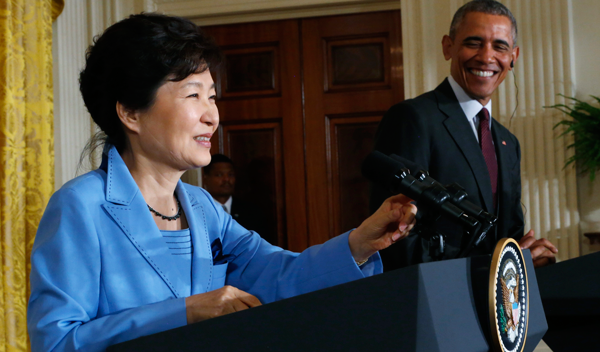SABRINA VERDUZCO WRITES – The United States and South Korea displayed a new desire to cement a lasting relationship between the two countries on October 16. Obama and South Korean President Park Geun-Hye demonstrated an eagerness to strengthen the US-South Korea alliance on October 16. In a statement from the White House, the talks were intended to be an opportunity to, “…exchange views on a broad range of security, economic, and global issues, including the U.S.-South Korean alliance and the critical role it plays in assuring regional stability and security.”
With both Obama and Park exhibiting similar mindsets regarding the importance of maintaining favorable relations between the U.S. and South Korea, it can be inferred that the talks achieved the task of reassuring the people of each country that a state of security remains a tangible reality despite North Korea’s insistent aggression towards countries that oppose it.
Obama suggested the intent to negotiate with North Korea on easing sanctions in return for implementing limits on North Korea’s nuclear weaponry. This serves as proof that North Korea was given an ample opportunity to restore ties with the U.S. if the North showed a willingness to comply with these requirements.
However, North Korea continues to advertise a fierce ability to protect itself from other countries – both by admonishing opposing countries and by conducting three nuclear tests and threatening a fourth as part of their weapons and missile program. This consistent growl serves as a stark contrast to South Korea’s sunnier side, which now embodies compliancy and cooperation.
Even so, according to the New York Times, the two leaders came to a consensus that condemned the human rights situation in the North and promised to confront “its advancing nuclear and ballistic weapons proliferation with utmost urgency and determination.”
Another proposition that emerged during the talks was the existing negative stigma pertaining to Seoul’s relations with China. Obama negates this mentality by saying he had no concern with South Korea’s growing relations with China.
Overall, the talks looked to be mutually beneficial between the two countries. South Korea benefited from this talk because the country relies on the United States to counter threats from its nuclear-armed counterpart, and the U.S. perceives South Korea as an ally that serves as a counterweight to the economic and military rise of China.

